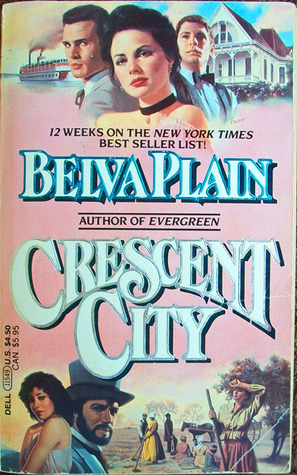 I picked up this book in hopes that it would fulfill the "Civil War romance" category in the Unapologetic Romance Readers 2017 challenge. When it quickly became evident that it would not, I should have just let it go. But I didn't. I was also reading another of those family-centered sagas, The Tea Rose, and quite enjoying it, so I kept hoping I'd hit a point in Crescent City where it would have the same impact. Unfortunately, it never did, and it became a slog just to get through it.
I picked up this book in hopes that it would fulfill the "Civil War romance" category in the Unapologetic Romance Readers 2017 challenge. When it quickly became evident that it would not, I should have just let it go. But I didn't. I was also reading another of those family-centered sagas, The Tea Rose, and quite enjoying it, so I kept hoping I'd hit a point in Crescent City where it would have the same impact. Unfortunately, it never did, and it became a slog just to get through it.Basically, this book wants to be Gone With the Wind. Not in location or characters or even plot (well, somewhat plot) but in structure and feel. Ultimately, however, it doesn't capture the sweeping scope or any of the emotion that GWTW, problematic as it is at points, displays with such beauty.
The main character here is Miriam, whose Jewish family hails from Germany. Her father left Miriam and her older brother with their maternal grandfather after the death of their mother, and the book begins with him returning to take them to New Orleans, where he's built a new prosperous life. Some of the book attempts to deal with faith and maintaining it in times of hardship and in the face of adversity, and some of it tries to deal with matters like the immorality of slavery but also wanting to support your family who support slavery--but none of this is handled very well, and the main character who actually has these struggles, Miriam's brother, is kind of written off in the end as a "social justice warrior" of the 1800s, with an attitude of "Oh, he picks up whatever cause comes his way, none of them are really meant or important," which really irked me.
Most of the book is really about Miriam's life in an unhappy marriage, one she's basically forced into before she's ready to a man she despises. With twin children and a large extended family to care for, Miriam struggles with keeping her life together during the Civil War, including engaging in an illicit romance outside of her marriage and another interested party who she loves but in a brotherly way--awkward. While all of this seems like it would be ripe for a story full of emotion, Plain's writing manages to be flat and boring, making every chapter seem interminable and the entire book feel like a slog towards some unknown goal that never truly felt reached. The setting in both place and time held so much promise, but aside from a few atmospheric happenings, they weren't leveraged to the story's benefit. Having a Jewish main character in this time and place was interesting, but it only occasionally played into the story and didn't really lead to much conflict other than a few spats between Miriam and one of her stepsisters (I think; the relations here were a bit complicated). At a few points, Plain also falls into the bad habit of using lengthy journal or letter entries to convey the characters' emotions, because she's not really adept at working them into the narrative itself.
Also, the Kindle edition of this book is very poorly converted from the text version, so readers beware on that.
Ultimately, a cold and boring book that didn't deliver on the promise it held. If you're looking for something Gone With the Wind-like in scope and feel, read The Thorn Birds or maybe The Tea Rose; Crescent City just can't compare.
1.5 stars out of 5.
No comments:
Post a Comment